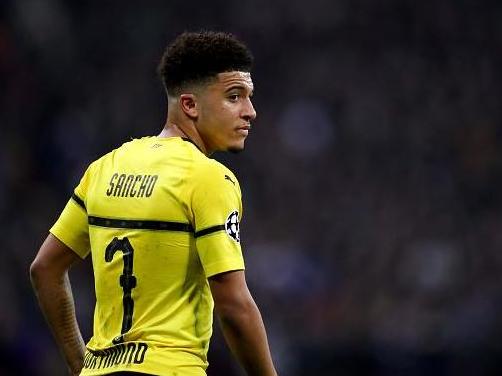For talents like Jadon Sancho to shine, we need to know when to let them stray close to the sun
The 19-year-old was dropped from Borussia Dortmund’s squad after returning late from England duty – but when you’re living under a magnifying glass of pressure, it’s only natural to look for freedom

As Borussia Dortmund lined up for their biggest game of the season, Jadon Sancho quietly frogmarched to the club’s training ground for his Saturday detention. And, as the heavy rain pelted over industrial Germany, the 19-year-old spent an hour with a fitness trainer, sweating out his punishment, running drills back and forth, Icarus being pulled back to a sludgy training pitch. The £86,000 fine for his late return from England duty was symbolic; his manager’s comments a publicised slap on the wrists, but to reduce a teenager who’s directly contributed to 38 goals in 41 league appearances to jog laps around the pitch, that was the real warning shot.
“Jadon is a great player, no discussions,” Lucien Favre said with the gravelled tone of a schoolmaster. “But he still has a lot to learn.”
It was, perhaps, no matter how seemingly innocuous, the first public setback for a player who’s risen so relentlessly to the vanguard of English football. Just a few days earlier, before starting for England against Czech Republic, Sancho was playing and high-fiving schoolkids on a pristine tiger-striped five-a-side pitch in Kennington. A caged haven he’d help to build, just a short walk from the Guinness Trust Building flat where he was raised. “I hope the local kids feel empowered to follow in my footsteps,” he said. And although it’s easy to denote it as easy PR spin or media training, that grounded nature resonates with a starlet not at risk of flying too close to the sun.
Of course, he’s guarded in the way any teenager would be in a world that judges them like a favourite son. His expression and imagination on the football pitch is hidden away from the public eye, perhaps by a grounded upbringing, teammates’ advice, or natural instinct, but for a 19-year-old who could become the best English player of a generation, he’s never struck a tone of wanting to savour the spotlight.
At 12 he left home and was thrust into a type of cultural anarchy, exchanging inner-city London for a Watford boarding school. At 15, he left behind his mum and sister to move to Manchester and join the country’s best academy. Two years later, as Pep Guardiola pleaded with him to sign a new deal, it was Sancho who forced through a move to Dortmund and sacrificed the group stage of England’s U17 World Cup win. While others chose security, he took calculated risks, centred solely around his career, eschewing comfort and celebrity for a club who’d allow him to flourish.
It’s only natural that the unerring success he’s experienced since will inflate his ego. And like any impossibly talented sportsperson, that necessary confidence can bleed into carelessness. The laziness to arrive late to training, the grandeur to spend an extra day with friends on a rare visit home. These are natural pitfalls, perhaps, necessities for any talent who is more imaginative and extraordinary than the norm. After all, not one of the senior figures in England’s dressing room would claim to have achieved greatness without a misstep or rule broken along the way.
It’s easy to hold footballers to a higher standard than ourselves, but it’s impossible to avoid that Sancho has been forced to mature unimaginably fast. He’s plagued by constant speculation over his return, rumblings over potential offers and new contracts, the prospect of living in London, Manchester, Barcelona or Madrid. He became the first player born in the 2000s to represent England and the figurehead for a generation looking to break out overseas. At an age where life is usually an orbit of first jobs and free-drinking, he’s scrutinised and examined for every frill or flaw. It would make most men crack, and yet he’s approached it with remarkable insouciance since he was a 17-year-old boy.

It is, obviously, always underpinned by his performances on the pitch. If they are to dip, the pyramid can crumble as we’ve seen with so many prodigious talents across any number of disciplines. The difference is while Sancho learns and matures, he has already proved himself in a way few have managed.
After being left on the bench for Dortmund’s 1-1 draw with Freiburg a fortnight ago, Favre said he “was dead and needed a break”. And, after landing at Birmingham Airport with the England squad at 4am on 15th October, he took a taxi to London to visit his family. Sometimes, when you’re living under a magnifying glass of pressure, a drop into childlike freedom and a quickly resolved Saturday detention can be a relief and a restart, rather than a tip to any iceberg.
“Tomorrow is a new day,” Favre said after the Monchengladbach game. “That’s all.”
Join our commenting forum
Join thought-provoking conversations, follow other Independent readers and see their replies
Comments
Bookmark popover
Removed from bookmarks